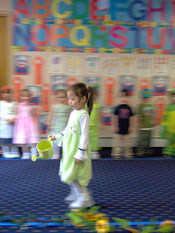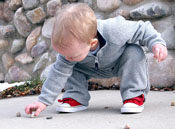This is a game which causes much amusement to a company of children, and even grown-ups may join in.
All the players, with the exception of two, leave the room. One of the outside party is then called in, and told that a new club has been formed and his name enrolled, but that he cannot be formally admitted unless he can guess the name of the club from the movements of the two members who have remained in the room. The candidate for admission is then offered a chair, and everything said and every movement made is mimicked by the other two.
Sometimes the new member guesses at once, but when unable to do this it is very funny to watch the effect that the copying of his every movement has upon him, especially when six or seven have been admitted.
When the name of the club has been guessed another candidate is invited in and the same performance takes place.
Games for All Occasions by Mary E. Blain



